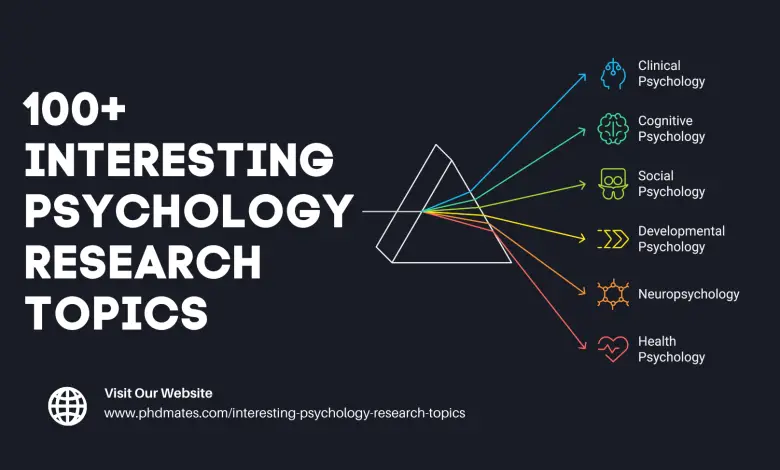100+ Interesting Psychology Research Topics For Research Paper, Thesis & Essays

Research in psychology remains a highly sought-after field, with journals and universities eagerly anticipating groundbreaking research in new areas. This article presents a curated list of intriguing research topics in psychology, suitable for writing PhD theses, research papers, or college essays.
The topics are meticulously selected based on a comprehensive review of the latest ongoing research publications, co-citing papers, core papers, and the mean of co-citing publication years. This ensures that the article remains relevant and up-to-date with the latest advancements in the field of psychology.
Research in psychology started in late 19 century and since then it has been one of the major scientific filed of study. It was in 1879 where Wilhelm Wundt established the first psychology laboratory at the University of Leipzig, Germany. Since then every university has a department, school or institute dedicated to Psychology.
G. Henriques had defined –
Psychology is divided into two domains: psychological formalism, which studies the mind and animal behavior, and human psychology, which investigates individual human behavior.
All the topics discussed in this article are relevant to any psychology research scholar. The article categorizes the current trends in psychology as –
- Experimental Psychology: This field focuses on studying psychological phenomena using scientific methods, often involving laboratory experiments to explore behavior and cognition.
- Clinical Psychology: Specializing in diagnosing and treating mental health disorders, emotional challenges, and behavioral issues, clinical psychologists use therapy and assessment to help individuals improve their well-being.
- Developmental Psychology: This field examines psychological growth and changes across the lifespan, from infancy to old age, focusing on cognitive, social, and emotional development.
- Cognitive Psychology: Studying mental processes such as perception, memory, problem-solving, language, and decision-making, cognitive psychologists aim to understand how individuals think and learn.
- Social Psychology: Exploring how individuals’ thoughts, feelings, and behaviors are influenced by the presence of others and social environments, social psychologists delve into the complexities of human interaction.
- Health & Well-Being Psychology: Investigating psychological factors that impact physical health and well-being, this field promotes healthy behaviors and coping strategies to enhance overall well-being.
- Educational Psychology: Focusing on how people learn and develop in educational settings, educational psychologists develop strategies to enhance learning and teaching methods, fostering a conducive learning environment.
- Applied Psychology: Utilizing psychological principles to solve real-world problems across various fields, including business, law, engineering, and human resource management, applied psychologists contribute to practical solutions and advancements.
- Neurosciences in Psychology: Studying the biological basis of behavior and mental processes by examining brain structures, neurochemistry, and neural networks, neuroscientific psychologists provide insights into the neural mechanisms underlying human cognition and behavior.
- Psychiatry and Mental Health: A medical field that diagnoses and treats mental illnesses, psychiatrists use medications, therapy, and other interventions to improve mental health and well-being.
Contents
1. Experimental Psychology
- Bayesian Modeling and Workflow Techniques
- Creativity and Perception in Artificial Intelligence
- Emotion Perception and Language
- Cross-Modal Associations in Sensory and Auditory Experiences
- Lexical Tests and Language Proficiency Across Languages
- Neural Dynamics of Action Control and Cognitive Flexibility
- Attention and Memory: Models of Visual Perception
- The Production Effect and Episodic Memory Across Adulthood
- Visual Memory and Attention: Interactions and Theoretical Frameworks
- Language and Emotion in Early Childhood Education
- Neural and Sensorimotor Dimensions of Abstract Concept Representation
- Visual Imagery and Aphantasia: Perception, Memory, and Emotion
- Eye Movements in Multilingual Reading and Language Processing
- Mind Wandering and Its Impact on Creative Processes
2. Clinical Psychology
- Virtual Reality Therapy in Mental Health
- Data Quality in Online Behavioral Research
- Mental Health Recovery for COVID-19 Survivors
- Compulsive Behaviors and Addiction Analysis
- Single-Case Research Designs: Validity, Analysis, and Applications
- Cultural Humility in Psychotherapy and Clinical Supervision
- Control-Mastery Theory in Psychotherapy: Concepts and Applications
- Performance Validity Assessment in Neuropsychological Evaluations and ADHD
- Exposure Therapy Mechanisms in Anxiety and Fear Disorders
- Enhancing Positive Affect in Anxiety and Depression Treatment
- Functional Communication Training and Relapse Mitigation Strategies
- Health Challenges and Stigma Among Homeless Populations
- Applied Behavior Analysis and Autism: Perspectives and Interventions
- Assessment and Treatment in Autism with Intellectual Disabilities
- Parenting Interventions for Children with Callous-Unemotional Traits
3. Developmental Psychology
- Family Stress and Mental Health in Diverse Communities
- Adverse Childhood Experiences and Academic Outcomes
- Adolescent Mental Health and Peer Dynamics
- ADHD and Mental Health Challenges in Prison Populations
- Irritability in Youth: Developmental Trajectories and Mental Health
- Anxiety Interventions for Youth with Autism Spectrum Disorder
- Subtyping Conduct and Oppositional Defiant Problems in Children
- Developmental Prosopagnosia: Classification, Prevalence, and Cognitive Diversity
- Neurodevelopmental Disorders: Autism, ADHD, and Comorbidity Insights
- Parental Influence on Child Emotion Regulation and Socialization
- LGBTQ Identity and Marketing: Diversity and Well-Being
4. Cognitive Psychology
- Eye Tracking and Cognitive Load Studies
- Curiosity and Information-Seeking Behaviors
- Power Analysis in Behavioral Research
- Integrating Prior Knowledge for Enhanced Text Comprehension
- Teaching Writing: Strategies, Challenges, and Educational Outcomes
- Social Comparisons and Evaluation in Educational Psychology
- Abstract Concepts in Human Cognition
- The Role of Epistemic Trust in Mentalizing
5. Social Psychology
- Racial Bias and Cognitive Bias in Society
- Socioeconomic Factors in Developmental Science
- Cultural Bias in Global Research
- Role Theory and Consumer Language in Service Management
- Workaholism, Perfectionism, and Work-Family Conflict Dynamics
- The Intersection of Marketing and LGBTQ Identity
6. Health and Well-Being
- Mindfulness Interventions and Resilience Strategies
- Menopause and Mental Health
- Telehealth Efficacy During COVID-19
- Suicide Crisis Syndrome: Assessment, Risk Management, and Prevention
- Mental Health, Eating Disorders, and Youth Suicide Trends
- Athletes’ Dual Careers and Mental Health in Sport
- Breathwork and Digital Interventions for Stress Reduction
- Mental Health Impacts of Long COVID and Recovery
- Ketogenic Diets and Metabolic Therapy in Mental Health
7. Educational Psychology
- Social-Emotional Learning Integration
- Mental Health and Academic Stress in Students
- Student Well-Being and Teacher Emotions in Education
- Social Comparisons and Their Role in Learning and Motivation
- The Influence of Parenting Styles on Academic Success
8. Applied Psychology
- Impacts of Zoom Fatigue on Well-being
- Behavioral Changes through Physical Activity Theories
- Daily Work Dynamics: Stress, Recovery, and Supervisor Influence
- AI-Driven Personality Assessment in Automated Video Interviews
- Addressing Common Method Bias in Organizational Research Methodologies
- Religion and Spirituality in Mental Health and Recovery
- Stress Management Strategies Using Digital Tools
9. Neurosciences in Psychology
- Cross-Cultural Music Cognition and Social Dynamics
- Sensory Dimensions in Animal Behavior
- Neural Dynamics of Action Control and Cognitive Flexibility
- Persistent Inflammation and Personalized Health in Neuroscience
- Understanding the Neural Basis of Abstract Thinking
10. Psychiatry and Mental Health
- Transition Challenges for Healthcare Professionals
- Adolescent Peer and Family Dynamics
- Mental Health Challenges in UK Veterans During COVID-19
- Treatment Approaches for Posttraumatic Stress Disorder in Adults
- Borderline Personality Disorder: Diagnosis, Treatment, and Gender Differences
- Guided Antipsychotic Reduction in Schizophrenia Treatment Strategies
- Personality Disorder Models: DSM-5 and ICD-11 Perspectives
- Cognitive Disengagement Syndrome and ADHD: Developmental and Clinical Insights
- Stigma, Grief, and Recovery in Suicide Bereavement Studies
- Childhood Maltreatment, Emotion Regulation, and Internet Addiction
- Complex Posttraumatic Stress Disorder: Assessment, Risk, and Comorbidities
- Eating Disorders: Treatment, Comorbidities, and Diagnostic Challenges
